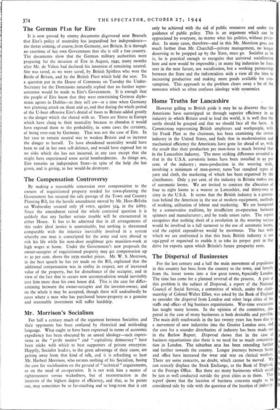Home Truths for Lancashire
However galling to British pride it may be to discover that the Americans have outstripped us through superior efficiency in an industry in which Britain used to lead the world, it is well that the nettle should be grasped and that we should face all the facts. A Commission representing British employers and workpeople, with Sir Frank Platt as the chairman, has been examining the cotton industry in the United States, and finds that in modernisation and mechanical efficiency the Americans have gone far ahead of us, with the result that their production per man-hour is much beyond that in the Lancashire industry. The most striking difference revealed is that in the U.S.A. automatic looms have been installed in 95 per cent, of the industry ; mass-production in the weaving mills, involving a minimum of man-power, turns *out standard types of yarn and cloth, the marketing of which has been organised by the distributors. Only 5 per cent, of the industry in Britain makes use of automatic looms. We are invited to contrast the allocation of four to eight looms to a weaver in Lancashire, and thirty-two to sixty in the U.S.A. It seems that the British industry is a genera- tion behind the American in the use of modern equipment, methods of working, utilisation of labour and marketing. We are hampered by a conservative tradition, by insufficient co-operation between spinners and manufacturers, and by trade union rules. The report recognises that nothing short of a revolution in the weaving section would be involved in a full turnover to the use of automatic looms, and the capital expenditure would be enormous. The fact with which we are confronted is that this basic British industry is not equ;pped or organised to enable it to take its proper part in that drive for exports upon which Britain's future prosperity rests.


























 Previous page
Previous page